-
 Stocks drop after US economy contracts amid tariffs turmoil
Stocks drop after US economy contracts amid tariffs turmoil
-
US economy unexpectedly shrinks on import surge ahead of Trump tariffs

-
 Dravid says Suryavanshi, 14, needs support from fame
Dravid says Suryavanshi, 14, needs support from fame
-
Arsenal can win 'anywhere' says Merino after Champions League defeat by PSG

-
 Bangladesh crush Zimbabwe by an innings in second Test
Bangladesh crush Zimbabwe by an innings in second Test
-
Swiatek recovers against Keys to reach Madrid Open semis

-
 Spurs captain Son out of first leg of Europa League semi-final
Spurs captain Son out of first leg of Europa League semi-final
-
US economy unexpectedly shrinks in first three months of Trump presidency

-
 India to ask caste status in next census for first time in decades
India to ask caste status in next census for first time in decades
-
Burkina junta rallies supporters after claimed coup 'plot'

-
 Forest owner Marinakis steps back as European qualification looms
Forest owner Marinakis steps back as European qualification looms
-
US economy unexpectedly contracts in first three months of Trump presidency

-
 Bilbao will give 'soul' to beat Man United: Nico Williams
Bilbao will give 'soul' to beat Man United: Nico Williams
-
Sweden arrests teen after triple killing

-
 Pakistan says India planning strike after deadly Kashmir attack
Pakistan says India planning strike after deadly Kashmir attack
-
Cardinals lay groundwork for conclave, hope for quick vote

-
 More automakers drop earnings guidance over tariffs
More automakers drop earnings guidance over tariffs
-
William and Kate release romantic image on low-key anniversary

-
 Israel says strikes Syria to shield Druze as clashes spread
Israel says strikes Syria to shield Druze as clashes spread
-
Champions Cup format 'not perfect' says EPCR boss

-
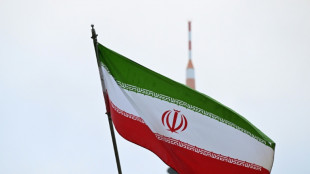 Iran hangs man as Israeli spy after 'unfair' trial: activists
Iran hangs man as Israeli spy after 'unfair' trial: activists
-
Stock markets mostly rise ahead of US economic data, tech earnings

-
 German growth better than expected but tariff turmoil looms
German growth better than expected but tariff turmoil looms
-
Sinner denies beneficial treatment in doping scandal ahead of Rome return

-
 Eurozone economy grows more than expected despite US tariff turmoil
Eurozone economy grows more than expected despite US tariff turmoil
-
Toulouse hooker Mauvaka out of Champions Cup semi

-
 Germany's next finance minister, 'bridge-builder' Lars Klingbeil
Germany's next finance minister, 'bridge-builder' Lars Klingbeil
-
Mehidy century puts Bangladesh in command against Zimbabwe

-
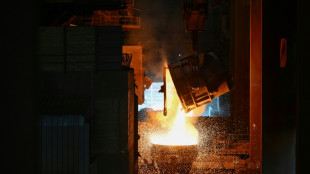 Steelmaker ArcelorMittal warns of uncertainty
Steelmaker ArcelorMittal warns of uncertainty
-
Vietnam's Gen-Z captivated by 50-year-old military victory

-
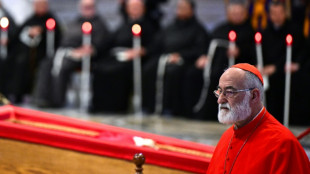 Moroccan-based cardinal says Church does not need Francis 'impersonator'
Moroccan-based cardinal says Church does not need Francis 'impersonator'
-
US official tells UN top court 'serious concerns' over UNRWA impartiality

-
 Jeep owner Stellantis suspends outlook over tariffs
Jeep owner Stellantis suspends outlook over tariffs
-
New Zealand, Phillippines sign troops deal in 'deteriorating' strategic environment

-
 Aston Martin limits US car imports due to tariffs
Aston Martin limits US car imports due to tariffs
-
Pakistan says India planning strike as tensions soar over Kashmir

-
 Australian triple-murder suspect allegedly cooked 'special' mushroom meal
Australian triple-murder suspect allegedly cooked 'special' mushroom meal
-
Most stock markets rise despite China data, eyes on US reports

-
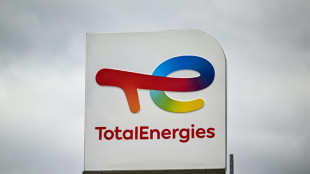 TotalEnergies profits drop as prices slide
TotalEnergies profits drop as prices slide
-
Volkswagen says tariffs will dampen business as profit plunges

-
 Jeep owner Stellantis suspends 2025 earnings forecast over tariffs
Jeep owner Stellantis suspends 2025 earnings forecast over tariffs
-
China's Shenzhou-19 astronauts return to Earth

-
 French economy returns to thin growth in first quarter
French economy returns to thin growth in first quarter
-
Ex-Premier League star Li Tie loses appeal in 20-year bribery sentence
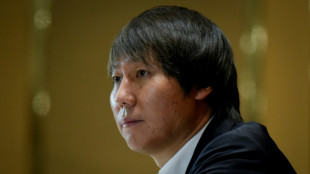
-
 Belgium's green light for red light workers
Belgium's green light for red light workers
-
Haliburton leads comeback as Pacers advance, Celtics clinch

-
 Rahm out to break 2025 win drought ahead of US PGA Championship
Rahm out to break 2025 win drought ahead of US PGA Championship
-
Japan tariff envoy departs for round two of US talks

-
 Djurgarden eyeing Chelsea upset in historic Conference League semi-final
Djurgarden eyeing Chelsea upset in historic Conference League semi-final
-
Haliburton leads comeback as Pacers advance, Pistons stay alive

Europe's space telescope launches to target universe's dark mysteries
Europe's Euclid space telescope blasted off Saturday on the first-ever mission aiming to shed light on two of the universe's greatest mysteries: dark energy and dark matter.
The telescope successfully took off from Cape Canaveral, Florida, at 11:12 am local time (1512 GMT) on a Falcon 9 rocket from the US company SpaceX.
The European Space Agency was forced to turn to billionaire Elon Musk's firm to launch the mission after Russia pulled its Soyuz rockets in response to sanctions over the war in Ukraine.
After a month-long journey through space, Euclid will join its fellow space telescope James Webb at a stable hovering spot around 1.5 million kilometers (more than 930,000 miles) from Earth called the second Lagrange Point.
From there, Euclid will chart the largest-ever map of the universe, encompassing up to two billion galaxies across more than a third of the sky.
By capturing light that has taken 10 billion years to reach Earth's vicinity, the map will also offer a new view of the 13.8-billion-year-old universe's history.
Scientists hope to use this information to address what the Euclid project manager Giuseppe Racca calls a "cosmic embarrassment": that 95 percent of the universe remains unknown to humanity.
Around 70 percent is thought to be dark energy, the name given to the unknown force that is causing the universe to expand at an accelerated rate.
And 25 percent is dark matter, thought to bind the universe together and make up around 80 percent of its mass.
"Ever since we could see stars we've wondered, is the universe infinite? What is it made out of? How does it work?" NASA Euclid project scientist Michael Seiffert told AFP.
"It's just absolutely amazing that we can take data and actually start to make even a little bit of progress on some of these questions."
- 'Dark detective' -
Euclid consortium member Guadalupe Canas told a press conference ahead of the launch that the space telescope was a "dark detective" which can reveal more about both elements.
Euclid, which is 4.7 meters (15 feet) tall and 3.5 meters wide, will use two scientific instruments to map the sky.
Its visible light camera will let it measure the shape of galaxies, while its near-infrared spectrometer and photometer will allow it to measure how far away they are.
So how will Euclid try to spot things that cannot be seen? By searching for their absence.
The light coming from billions of light years away is slightly distorted by the mass of visible and dark matter along the way, a phenomenon known as weak gravitational lensing.
"By subtracting the visible matter, we can calculate the presence of the dark matter which is in between," Racca told AFP.
While this may not reveal the true nature of dark matter, scientists hope it will throw up new clues that will help track it down in the future.
For dark energy, French astrophysicist David Elbaz compared the expansion of the universe to blowing up a balloon with lines drawn on it.
By "seeing how fast it inflates," scientists hope to measure the breath -- or dark energy -- making it expand.
- 'Goldmine' -
A major difference between Euclid and other space telescopes is its wide field of view, which takes in an area equivalent to two full moons.
Project scientist Rene Laureijs said that this wider view means Euclid will be able to "surf the sky and find exotic objects" like black holes that the Webb telescope can then investigate in greater detail.
Beyond dark energy and matter, Euclid's map of the universe is expected to be a "goldmine for the whole field of astronomy," said Yannick Mellier, head of the Euclid consortium.
Scientists hope Euclid's data will help them learn more about the evolution of galaxies, black holes and more.
The first images are expected once scientific operations start in October, with major data releases planned for 2025, 2027 and 2030.
The 1.4 billion euro ($1.5 billion) mission is intended to run until 2029, but could last a little longer if all goes well.
burs-la/ia/bfm/leg/la/nro/md
P.Costa--AMWN


